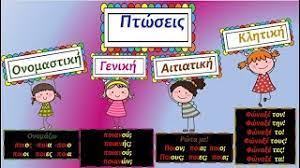Language/Modern-greek-1453/Grammar/The-cases-in-Modern-Greek
Inflection in the Greek Language[edit | edit source]
The Greek language is a fully inflected language.Each Greek word actually changes form (inflection) based upon the role that it plays in the sentence.
The Greek nominal system displays inflection for two numbers (singular and plural), three genders (masculine, feminine and neuter), and four cases (nominative, genitive, accusative and vocative). Case, number and gender are marked on the noun as well as on articles modifying it.There are four cases.
The cases in Modern Greek[edit | edit source]
In Modern Greek we have to deal with the following cases :
| η ονομαστική | the nominative |
| η γενική | the genitive |
| η αιτιατική | the accusative |
| η κλητική | the vocative |
The nominative[edit | edit source]
The nominative, is designating the subject of a verb and the words that agree with it. It is the basic case denoting the declinable words in dictionaries
- the subject does or makes something
- the subject is in a particular situation
- the subject experiences something
- doing something to the subject
Ex : Ο Γιάννης έφυγε : John left
Η Πόπη έπεσε στο έδαφος : Poppy fell on the ground
The genitive[edit | edit source]
The genitive case denotes possession. A noun, pronoun, or adjective in the genitive case is often used as a possessive form or the object of a preposition.
The genitive case is used much like in the English language with words such as: “my,” “your,” “his,” “hers.”
A genitive often follows after the noun it qualifies. A genitive occurs with verbs, adjectives, adverbs, and prepositions.
Ex : Το αυτοκίνητο του Νίκου : Niko’s car.
Τα πόδια των καρεκλών : The legs of the chairs.
Accusative Case[edit | edit source]
The accusative case is the most common as it is the most general in its unaffected meaning. In both ancient and modern Greek, nouns, adjectives, verb participles, articles, and pronouns are used in the accusative case. The accusative marker used depends on gender, number, and declension.
Ex : Ο Νίκος γνωρίζει τον Κώστα : Nikos knows Costa.
Διάβαζα όλη την ημέρα : I read throughout the day.
Vocative Case[edit | edit source]
The vocative is used for one direct addresses a person or thing, such as when you are talking to someone.
To form this vocative it will add nothing to the stem of the noun.
Ex : Έλα, Δημήτρη : Come on, Dimitri!
Νίκο! : Nico!
Ιατρέ! : Docter!
Author[edit source]
- Ευγενική χορηγία που στοχεύει να βοηθήσει μαθητές ή μη, απανταχού της Γης, που επιδίδονται στην εκμάθηση της ελληνικής γλώσσας!
- Contribution bénévole visant à aider les personnes, partout dans le monde, qui sont engagées dans l'apprentissage de la langue grecque !
- Voluntary contribution aimed at helping people, all over the world, who are committed to learning the Greek language!
Other Lessons[edit | edit source]
- Adjective and Adverb
- Negations
- Words written with γγ or γκ
- Negative Sentence
- The predicate
- Verbes elliptiques, impersonnels et irréguliers
- Common Mistakes in Learning Greek
- The final v
- Irregular adjectives
- Particles

